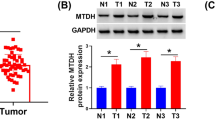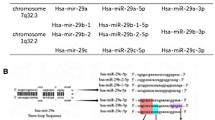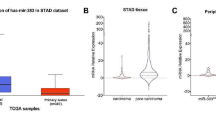Abstract
Background
B7 homolog 3 (B7-H3), a member of the immunoregulatory ligand B7 family, is pivotal in T-cell-mediated immune response. It is widely expressed in diverse human tumors and its high expression indicates the poor prognosis of the patients. Nonetheless, B7-H3’s role in colorectal cancer (CRC) needs to be further explored.
Methods
Western blot and immunohistochemistry were employed for detecting B7-H3 protein expression in CRC tissues and cell lines, respectively. Quantitative real-time polymerase chain reaction (qRT-PCR) was utilized for detecting B7-H3 mRNA and miR-128 expression levels. CRC cell lines SW620 and HT29 were used to construct B7-H3 overexpression or knockdown cell models, respectively. Cell counting kit-8 (CCK-8), 5-bromo-2′-deoxyuridine (BrdU), and scratch wound healing assays were employed for evaluating the effects of B7-H3 on CRC cell multiplication and migration. Besides, the regulatory relationship between miR-128 and B7-H3 was validated through dual-luciferase reporter gene assay, qRT-PCR, and western blotting.
Results
B7-H3 expression level was remarkably elevated in CRC tissues and cell lines, and its high expression level was associated with increased tumor size, positive lymph node metastasis, and increased T stage. In CRC cells, B7-H3 overexpression significantly facilitated the cell multiplication and migration, while B7-H3 knockdown worked oppositely. Moreover, B7-H3 was identified as a target of miR-128, and miR-128 negatively regulated B7-H3 expression in CRC cells.
Conclusion
B7-H3 expression is upregulated in CRC tissues and cell lines, and B7-H3 participates in promoting the proliferation and migration of CRC cells. Besides, B7-H3 expression is negatively regulated by miR-128 in CRC.




Similar content being viewed by others
Data Availability
The data used to support the findings of this study are available from the corresponding author upon request.
References
DeSantis, C. E., Lin, C. C., Mariotto, A. B., Siegel, R. L., Stein, K. D., & Kramer, J. L., et al. (2014). Cancer treatment and survivorship statistics, 2014. CA: A Cancer Journal for Clinicians, 64(4 Jul–Aug), 252–271.
Bray, F., Ferlay, J., Soerjomataram, I., Siegel, R. L., Torre, L. A., & Jemal, A. (2018). Global cancer statistics 2018: GLOBOCAN estimates of incidence and mortality worldwide for 36 cancers in 185 countries. CA: A Cancer Journal for Clinicians, 68(6 Nov), 394–424.
Kuipers, E. J., Grady, W. M., Lieberman, D., Seufferlein, T., Sung, J. J., & Boelens, P. G., et al. (2015). Colorectal cancer. Nature Review Disease Primers, 1(Nov), 15065.
Martini, G., Troiani, T., Cardone, C., Vitiello, P., Sforza, V., & Ciardiello, D., et al. (2017). Present and future of metastatic colorectal cancer treatment: a review of new candidate targets. World Journal of Gastroenterology, 23(26 Jul), 4675–4688.
Collins, M., Ling, V., & Carreno, B. M. (2005). The B7 family of immune-regulatory ligands. Genome Biology, 6(6), 223.
Hansen, J. D., Du Pasquier, L., Lefranc, M. P., Lopez, V., Benmansour, A., & Boudinot, P. (2009). The B7 family of immunoregulatory receptors: a comparative and evolutionary perspective. Molecular Immunology, 46(3 Jan), 457–472.
Sun, X., Vale, M., Leung, E., Kanwar, J. R., Gupta, R., & Krissansen, G. W. (2003). Mouse B7-H3 induces antitumor immunity. Gene Therapy, 10(20 Sep), 1728–1734.
Ling, V., Wu, P. W., Spaulding, V., Kieleczawa, J., Luxenberg, D., & Carreno, B. M., et al. (2003). Duplication of primate and rodent B7-H3 immunoglobulin V- and C-like domains: divergent history of functional redundancy and exon loss. Genomics, 82(3 Sep), 365–377.
Hasselbalch, H. C. (2012). Perspectives on chronic inflammation in essential thrombocythemia, polycythemia vera, and myelofibrosis: is chronic inflammation a trigger and driver of clonal evolution and development of accelerated atherosclerosis and second cancer? Blood, 119(14 Apr), 3219–3225.
Ingebrigtsen, V. A., & Boye, K. (2014). B7-H3 expression in colorectal cancer: associations with clinicopathological parameters and patient outcome. BMC Cancer, 14(Aug), 602.
Jiang, B., Zhang, T., Liu, F., Sun, Z., Shi, H., & Hua, D., et al. (2016). The co-stimulatory molecule B7-H3 promotes the epithelial-mesenchymal transition in colorectal cancer. Oncotarget, 7(22 May), 31755–31771.
Xue, J., Niu, J., Wu, J., & Wu, Z. H. (2014). MicroRNAs in cancer therapeutic response: friend and foe. World Journal of Clinical Oncology, 5(4 Oct), 730–743.
Friedman, R. C., Farh, K. K., Burge, C. B., & Bartel, D. P. (2009). Most mammalian mRNAs are conserved targets of microRNAs. Genome Research, 19(1 Jan), 92–105.
Li, L., Wang, X., Li, W., Yang, L., Liu, R. & Zeng, R. et al.(2018). miR-21 modulates prostaglandin signaling and promotes gastric tumorigenesis by targeting 15-PGDH. Biochemical and Biophysical Research Communications, 495(1 Jan), 928–934.
Yao, R., Xu, L., Wei, B., Qian, Z., Wang, J., & Hui, H., et al. (2019). miR-142-5p regulates pancreatic cancer cell proliferation and apoptosis by regulation of RAP1A. Pathology, Research and Practice, 215(6 Jun), 152416.
Zhou, T., Wu, L., Wang, Q., Jiang, Z., Li, Y., & Ma, N., et al. (2018). MicroRNA-128 targeting RPN2 inhibits cell proliferation and migration through the Akt-p53-cyclin pathway in colorectal cancer cells. Oncology Letters, 16(6 Dec), 6940–6949.
Zhou, Y. H., Chen, Y. J., Ma, Z. Y., Xu, L., Wang, Q., & Zhang, G. B., et al. (2007). 4IgB7-H3 is the major isoform expressed on immunocytes as well as malignant cells. Tissue Antigens, 70(2 Aug), 96–104.
Prasad, D. V., Nguyen, T., Li, Z., Yang, Y., Duong, J., & Wang, Y., et al. (2004). Murine B7-H3 is a negative regulator of T cells. The Journal of Immunology, 173(4 Aug), 2500–2506.
Suh, W. K., Gajewska, B. U., Okada, H., Gronski, M. A., Bertram, E. M., & Dawicki, W., et al. (2003). The B7 family member B7-H3 preferentially down-regulates T helper type 1-mediated immune responses. Nature Immunology, 4(9 Sep), 899–906.
Liu, Z., Zhang, W., Phillips, J. B., Arora, R., McClellan, S., & Li, J., et al. (2019). Immunoregulatory protein B7-H3 regulates cancer stem cell enrichment and drug resistance through MVP-mediated MEK activation. Oncogene, 38(1 Jan), 88–102.
Zhao, J., Meng, Z., Xie, C., Yang, C., Liu, Z., & Wu, S., et al. (2019). B7-H3 is regulated by BRD4 and promotes TLR4 expression in pancreatic ductal adenocarcinoma. The International Journal of Biochemistry & Cell Biology, 108(Mar), 84–91.
Jiang, B., Liu, F., Liu, Z., Zhang, T., & Hua, D. (2016). B7-H3 increases thymidylate synthase expression via the PI3k-Akt pathway. Tumour Biology, 37(7 Jul), 9465–9472.
Zhang, T., Jiang, B., Zou, S. T., Liu, F., & Hua, D. (2015). Overexpression of B7-H3 augments anti-apoptosis of colorectal cancer cells by Jak2-STAT3. World Journal of Gastroenterology, 21(6 Feb), 1804–1813.
Han, H., Wang, L., Xu, J., & Wang, A. (2018). miR-128 induces pancreas cancer cell apoptosis by targeting MDM4. Experimental and Therapeutic Medicine, 15(6 Jun), 5017–5022.
Zhao, J., Li, D., & Fang, L. (2019). MiR-128-3p suppresses breast cancer cellular progression via targeting LIMK1. Biomedicine & Pharmacotherapy, 115(Jul), 108947.
Lian, B., Yang, D., Liu, Y., Shi, G., Li, J., & Yan, X., et al. (2018). miR-128 targets the SIRT1/ROS/DR5 pathway to sensitize colorectal cancer to TRAIL-induced apoptosis. Cellular Physiology and Biochemistry, 49(6), 2151–2162.
Wu, L., Shi, B., Huang, K., & Fan, G. (2015). MicroRNA-128 suppresses cell growth and metastasis in colorectal carcinoma by targeting IRS1. Oncology Reports, 34(5 Nov), 2797–2805.
Liu, T., Zhang, X., Du, L., Wang, Y., Liu, X., & Tian, H., et al. (2019). Exosome-transmitted miR-128-3p increase chemosensitivity of oxaliplatin-resistant colorectal cancer. Molecular Cancer, 18(1 Mar), 43.
Wang, L., Kang, F. B., Sun, N., Wang, J., Chen, W., & Li, D., et al. (2016). The tumor suppressor miR-124 inhibits cell proliferation and invasion by targeting B7-H3 in osteosarcoma. Tumour Biology, 37(11 Nov), 14939–14947.
Zhu, X. W., Wang, J., Zhu, M. X., Wang, Y. F., Yang, S. Y., & Ke, X. Y. (2019). MicroRNA-506 inhibits the proliferation and invasion of mantle cell lymphoma cells by targeting B7H3. Biochemical and Biophysical Research Communications, 508(4 Jan), 1067–1073.
Acknowledgements
The authors thank Hubei Yican Health Industry Co., Ltd. for its linguistic assistance during the preparation of this manuscript.
Author information
Authors and Affiliations
Corresponding authors
Ethics declarations
Conflict of interest
The authors declare no competing interests.
Ethical approval
Our study was approved by the Ethics Review Board of Tongji Hospital, Tongji Medical College, Huazhong University of Science and Technology.
Additional information
Publisher’s note Springer Nature remains neutral with regard to jurisdictional claims in published maps and institutional affiliations.
Rights and permissions
About this article
Cite this article
Hu, X., Xu, M., Hu, Y. et al. B7-H3, Negatively Regulated by miR-128, Promotes Colorectal Cancer Cell Proliferation and Migration. Cell Biochem Biophys 79, 397–405 (2021). https://doi.org/10.1007/s12013-021-00975-0
Received:
Accepted:
Published:
Issue Date:
DOI: https://doi.org/10.1007/s12013-021-00975-0




